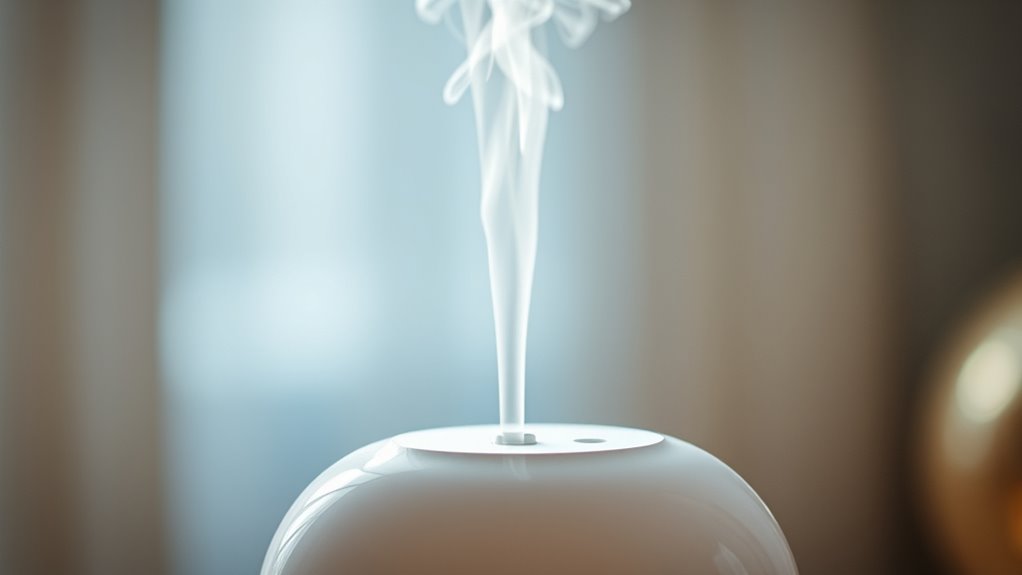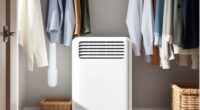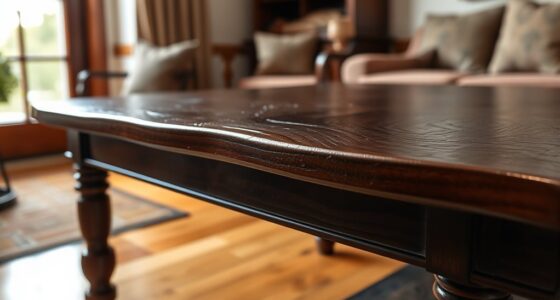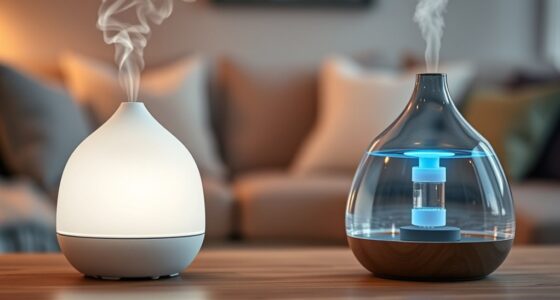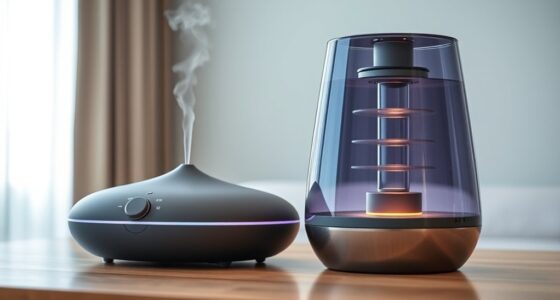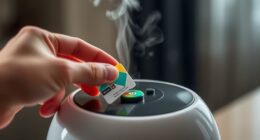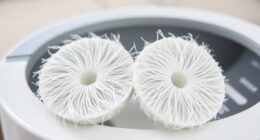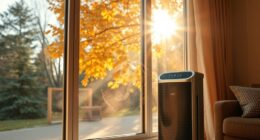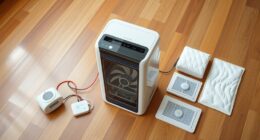Using essential oils in your humidifier can boost your home’s atmosphere with calming scents and aromatherapy benefits, but it also comes with risks. Not all humidifiers are safe for oils, and improper use can clog or damage your device. Inhaling concentrated particles might irritate your respiratory system or worsen allergies. To stay safe, choose models designed for oils and follow proper guidelines. Keep exploring to learn how to enjoy the benefits safely.
Key Takeaways
- Not all humidifiers are designed for essential oils; using incompatible devices can cause damage.
- Properly formulated diffuser oils and correct dilution are essential for safe aromatherapy in humidifiers.
- Essential oils can pose health risks, especially to respiratory conditions, pets, and sensitive individuals.
- Using oils directly in standard humidifiers can clog and deteriorate the unit, leading to costly repairs.
- Consult safety guidelines and professionals before adding essential oils to humidifiers to prevent risks.
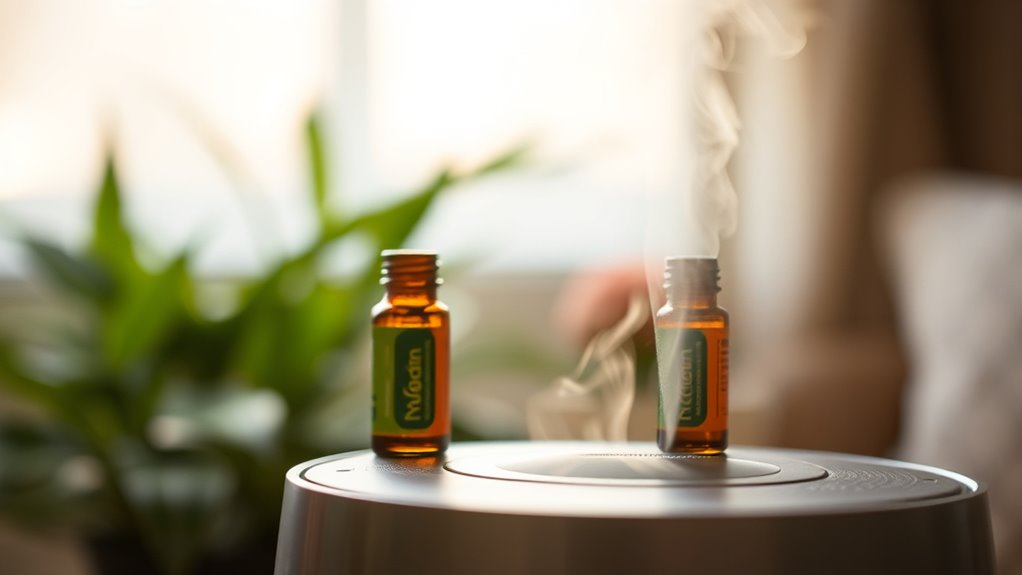
Have you ever wondered how to enhance your home’s atmosphere while adding moisture to the air? Using essential oils in your humidifier might seem like a simple solution, but before you add a few drops, it’s important to understand the potential risks and benefits. Many people turn to aromatherapy because of its calming and therapeutic effects, seeking to improve mood or reduce stress. The benefits of aromatherapy are well-documented; essential oils like lavender or eucalyptus can create a soothing environment and may even help with respiratory issues. However, blending oils with humidifiers isn’t always straightforward and can pose some dangers of oil use if you’re not careful.
One major concern is the potential for damage to your humidifier. Not all units are designed to handle essential oils, and adding oils directly to the water can clog the device or cause deterioration of internal components. Over time, this can lead to costly repairs or replacements. Moreover, improper use of oils in humidifiers can release concentrated particles into the air, which might irritate your lungs or worsen allergy symptoms, especially if you have respiratory conditions like asthma. It’s essential to know that not all essential oils are safe for inhalation, and some can even be toxic if misused.
Another risk involves the dangers of oil use around children and pets. Essential oils are potent and can be harmful if ingested or if they come into contact with sensitive skin. Diffusing oils in a humidifier without proper precautions can expose everyone in the room to higher concentrations of these substances, increasing the risk of adverse reactions. For example, oils like cinnamon or eucalyptus can cause respiratory distress or allergic reactions in some people and animals. That’s why it’s critical to research individual oils and follow safety guidelines before using them in your humidifier.
Despite these risks, many find the benefits of aromatherapy to be worth the effort, provided you use oils safely. When used correctly, essential oils can enhance your home environment by creating a relaxing atmosphere, improving sleep, or even boosting your immune system. To do this safely, consider using a diffuser specifically designed for essential oils, separate from your humidifier, or opt for specially formulated humidifier oils that are designed to be safe for use. Always dilute oils properly, and keep in mind that moderation is key. If you’re unsure about specific oils or how to use them safely, consult with a healthcare professional or aromatherapy expert to avoid any unintended health issues. Additionally, choosing appropriate diffuser models can help prevent damage and ensure safe diffusion of essential oils.
Frequently Asked Questions
Can Essential Oils Cause Respiratory Issues When Used in Humidifiers?
You might wonder if essential oils cause respiratory issues when used in humidifiers. If you have essential oil allergies, inhaling diffused oils can trigger symptoms like coughing or wheezing, impacting humidifier safety. Always use oils in moderation and verify proper ventilation. If you notice irritation or breathing problems, stop use immediately and consult a healthcare professional. Being cautious helps prevent potential respiratory issues linked to essential oils and humidifier use.
Are Certain Essential Oils More Toxic Than Others in Humidifier Use?
Imagine choosing a path through a garden; some flowers are fragrant but toxic, while others are safer options. Certain essential oils, like eucalyptus or tea tree, can be more toxic when used in humidifiers, risking respiratory issues. You should be cautious and opt for safer options like lavender or chamomile, which are less likely to cause harm. Always research and select oils known for their safety in diffusions.
How Often Should I Clean My Humidifier When Using Essential Oils?
You should clean your humidifier at least once a week when using essential oils, as part of regular humidifier maintenance. This prevents oil buildup and mold growth. If you use particularly potent essential oil types, consider cleaning more frequently. Always empty, rinse, and dry the tank thoroughly after each use, especially when adding oils, to keep your humidifier safe and functioning properly.
Is There a Safe Amount of Essential Oil to Add to a Humidifier?
You wonder about a safe amount of essential oil to add to your humidifier. To follow dilution guidelines, start with just a few drops—usually 2-3—and adjust based on your preferred scent strength. Keep in mind that using too much can cause irritation or damage your device. Always check your humidifier’s instructions and use oils sparingly to enjoy a pleasant, safe aroma without risks.
Do Essential Oils Damage Humidifier Components Over Time?
You might wonder if essential oils damage your humidifier over time. They can cause humidifier corrosion and essential oil buildup inside the unit, which may impair its function. Over time, this buildup can clog or corrode components, reducing efficiency and potentially leading to malfunctions. To prevent damage, it’s best to avoid using essential oils in standard humidifiers, or regularly clean and maintain your device if you choose to do so.
Conclusion
In the end, using essential oils in humidifiers is like walking a tightrope—exciting but risky if you’re not careful. While they can fill your space with delightful scents, they might also turn your home into a hazardous chemical lab if misused. Always follow safety guidelines, use high-quality oils, and consult experts if you’re unsure. Otherwise, you risk turning your cozy sanctuary into a volatile, unpredictable environment—definitely not a small matter!
